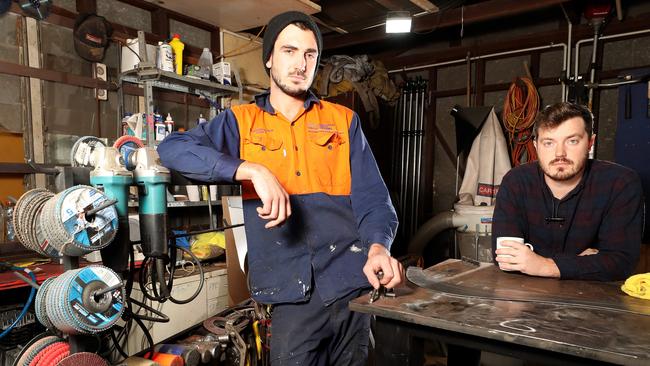Coronavirus: Grit and adaptability key to future work
Young Australians will need every bit of upskilling and gritty determination to get jobs after the COVID-19 pandemic has subsided.

Young Australians will need every bit of upskilling and gritty determination to get jobs after the COVID-19 pandemic has subsided, as they face a future of depressed wages and uncertain employment for years to come.
Yet the picture of a new lost generation of workers may have a bright side — some may emerge more highly qualified than ever, while others say they will simply find new and resourceful ways to earn a wage.
Experts are predicting that young people entering the workforce during and post-pandemic will be hit with a “scarring” effect, receiving slimmer pay packets even if they secure full-time employment.
“This downturn is unlike anything we have seen before,” said Ashton De Silva, associate dean of economics at RMIT’s Centre for People, Organisation and Work.
“The industries that young people are working in have already been characterised by a massive shift in the type of employment that is available. Now those same industries are bearing the brunt of this particular economic downturn.”
Sam Hopkins and Lucas Swaan are typical of underemployed young people riding the rollercoaster of COVID-19’s job impact.
Mr Hopkins, 26, was getting private commissions as an award-winning sculptor but has now gone back to his mobile handyman business to pay the bills. “I’ve always been resourceful, and being a handyman you can cover different areas of the trades.”
Yet paying jobs are scarce and he’s reliant for now on his $1500 a fortnight JobKeeper payment.
“I think my generation will definitely suffer and the economy will crash. But I’ll probably always be able to find some work, even though it’s not what I want to do.”
His friend Lucas Swaan, 27, had launched himself into his preferred career as an events manager in Sydney. “Then the shutdown came, and all the arts gigs ended just as I thought I was at last doing the job I wanted.”
He flew home to Perth, moved into a caravan because he couldn’t pay rent, and is helping Mr Hopkins with odd jobs. “I’ve realised I can’t just sit and wait for the coronavirus to end, so I decided if there was no real work, I’d upskill myself with an advanced diploma in business management.’
The pair say most of their friends have secured only part-time or casual jobs. Those ranks have increased dramatically in recent decades; younger workers made up one-third of all part-time workers in 1992 but now account for almost 60 per cent.
Yet casual jobs in hospitality, tourism and retail have dropped away as employers laid off staff as the coronavirus pandemic hit.
Many young people are turning to more study, even though there may be no immediate job prospects. Mr Swaan’s management course comes on top of his advanced diplomas in mechanical engineering and robotics.
Kevin Ambosta, 24, will graduate in mid-2021 after studying a Bachelor of Chemical Engineering and Masters of Biomedical Engineering. He says he has shelved his immediate hopes of working in the aviation sector.
“Aviation is off the cards for the short term … but it’s something I haven’t closed the book on.”
His greatest concern now is finding a “secure” job, and he said he was determined to be flexible.
“While one door has closed, there is still quite a lot I can look forward to with what this degree provides me,” he said.
Yet young graduates may have to reconcile themselves to the fact that a full-time job is no guarantee of a decent wage. Treasury has said Australians face reduced earnings for up to a decade after they graduate, and shocks that hit workers at the start of careers are more important than those that come later.
Kelly Fawcett, research and policy manager at the Foundation for Young Australians, said “This is the most significant disruption this generation will likely experience. And everything was not all rosy before for young people.”
She said some estimates have put the rate of under-utilisation of young people following the pandemic at as high as 60 per cent.
Additional reporting: Angelica Snowden, Rosie Lewis



To join the conversation, please log in. Don't have an account? Register
Join the conversation, you are commenting as Logout